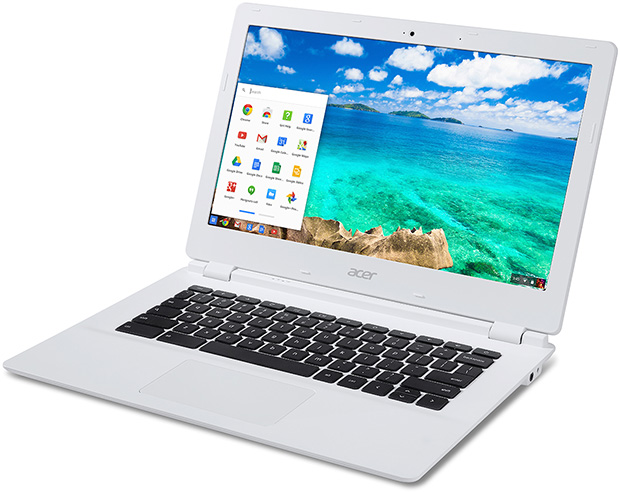Apple CEO Tim Cook Dismisses Meteoric Rise Of Chromebook 'Test Machines' In Education
When I was in grade school, one of the things I looked forward to was playing Oregon Trail on an Apple II machine. I also remember printing out "Do not enter" signs with skull and crossbones on an attached dot matrix printer. But that was a lifetime ago and these days Chromebooks have become the go-to computing device for many schools. Surprise, surprise, Apple CEO Tim Cook is dismissive of the trend.
One of the biggest appeals of Chromebooks is pricing. They're low cost PCs that connect to the Internet and allow kids to run a variety of programs, everything from productivity apps to lightweight games. They're also cheap devices for taking tests, and as states move away from bubble sheets to computerized testing, schools are finding that Chromebooks fit the bill.

Don't expect Apple to counter the Chromebook movement with inexpensive "test machines" of its own.
"Assessments don't create learning," Cook told BuzzFeed in an interview. "We are interested in helping students learn and teachers teach, but tests, no. We create products that are whole solutions for people -- that allow kids to learn how to create and engage on a different level."
From Cook's vantage point, Chromebooks are mere test taking machines and little more. But what that viewpoint doesn't take into account is Google's ecosystem -- Chromebooks are just fine for tapping into services like Gmail and Docs. And if you ask Google, it will tell you that 50 million teachers and students are using its Apps for Education programs.
Nevertheless, Cook sees the iPad as the smarter choice. It's more expensive and doesn't come standard with a keyboard, but they're offered to schools with native apps for education and integration with their curriculum. They're also less dependent on the web compared to Chromebooks.
This isn't the first time Cook has downplayed the competition in favor of its iPad line. Cook recently took a shot at Microsoft's Surface Book, saying that it "tries too hard to do too much." He also questioned why anyone would buy a traditional PC anymore instead of a 12.9-inch iPad Pro.
One of the biggest appeals of Chromebooks is pricing. They're low cost PCs that connect to the Internet and allow kids to run a variety of programs, everything from productivity apps to lightweight games. They're also cheap devices for taking tests, and as states move away from bubble sheets to computerized testing, schools are finding that Chromebooks fit the bill.

Don't expect Apple to counter the Chromebook movement with inexpensive "test machines" of its own.
"Assessments don't create learning," Cook told BuzzFeed in an interview. "We are interested in helping students learn and teachers teach, but tests, no. We create products that are whole solutions for people -- that allow kids to learn how to create and engage on a different level."
From Cook's vantage point, Chromebooks are mere test taking machines and little more. But what that viewpoint doesn't take into account is Google's ecosystem -- Chromebooks are just fine for tapping into services like Gmail and Docs. And if you ask Google, it will tell you that 50 million teachers and students are using its Apps for Education programs.
Nevertheless, Cook sees the iPad as the smarter choice. It's more expensive and doesn't come standard with a keyboard, but they're offered to schools with native apps for education and integration with their curriculum. They're also less dependent on the web compared to Chromebooks.
This isn't the first time Cook has downplayed the competition in favor of its iPad line. Cook recently took a shot at Microsoft's Surface Book, saying that it "tries too hard to do too much." He also questioned why anyone would buy a traditional PC anymore instead of a 12.9-inch iPad Pro.

